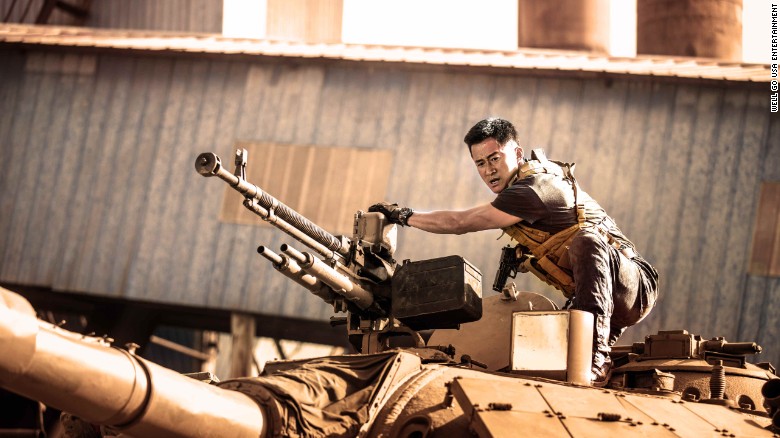By Ben Westcott and Steven Jiang, CNN
Hong Kong (CNN)There is a new brand of diplomacy taking hold in Beijing and its chief architects have a suitably fierce nickname to match their aggressive style -- they are the wolf warriors.
It's a phrase that is now used widely in Chinese state-run media as well as Western publications, and it was made clear last weekend that its proponents have the full support of the country's top diplomat.
Speaking at a press conference in Beijing Sunday, Foreign Minister Wang Yi said that China would now push back against "deliberate insults."
"We never pick a fight or bully others. But we have principles and guts. We will push back against any deliberate insult, resolutely defend our national honor and dignity, and we will refute all groundless slander with facts," said Wang, responding to a question from CNN.
But what is "wolf warrior" diplomacy, what does the name mean and where did it originate?
The "wolf warriors" represent a completely different type of diplomat to the famously bland Chinese foreign representatives of the past few decades.
Instead of long, verbose statements, these Chinese officials are taking to Twitter and other social media platforms to hit back directly at any criticism of China or the ruling Communist Party.
"Wolf Warrior" is actually the title of a hugely-successful series of patriotic action films in China, featuring Rambo-like protagonists who fight enemies at home and abroad to defend Chinese interests. The first film was released in 2015 and made more than $76 million (545 million yuan) at the box office.
It quickly spawned a sequel that became China's highest grossing film at the time when it was released in 2017. "Wolf Warrior 2"' was based around a squad of People's Liberation Army soldiers sent into an African country to rescue Chinese civilians. The film's tagline was, "Even though a thousand miles away, anyone who affronts China will pay."

A still from the patriotic Chinese film "Wolf Warrior 2," which was released to huge box office success in 2017.
An early comparison between the film series and China's diplomats came in July 2019, when Zhao Lijian, then a counselor at the Chinese embassy in Pakistan, began to hit back hard against the US government on Twitter.
In a controversial series of tweets, Zhao claimed the US had no right to criticize China on human rights abuses when it had problems with racism, income inequality and gun violence. Zhao alleged there were places in Washington DC where "the white (people)" never go.
It provoked a furious reaction from former US President Barack Obama's National Security Adviser Susan Rice, who called Zhao a "racist disgrace." But one year later, Zhao's career has only blossomed, and he is now one of the three high-profile spokespeople who hold the Chinese Foreign Ministry's daily press conference.
Not only that, but Chinese diplomats across the world have begun to mirror Zhao's aggressive tactics on Twitter, a platform long banned in China.
Zhao's boss Hua Chunying, director general of the Foreign Ministry's Department of Information, has frequently lashed out at critics on her Twitter account, which she only opened in October 2019 and now boasts almost 500,000 followers.
"Some politicians ignore the basic facts and make up countless lies and conspiracy theories concerning China," Hua said on May 24 amid deteriorating relations between the US and China over the coronavirus pandemic.
Some politicians ignore the basic facts and make up countless lies and conspiracy theories concerning China. The longer the list, the more it says about how low the rumor-mongers are willing to go and the more stains they will leave in history.
China's ambassador to the UK Liu Xiaoming has been another keen "wolf warrior," regularly using Twitter to hit back against critics of Beijing in Europe.
Speaking to state media on Monday, Liu said that the term "wolf warrior" was a misunderstanding of China's foreign policy, which he said was an "independent foreign policy of peace," but added sometimes a strong hand was needed.
"Where there is a 'wolf,' there is a warrior," Liu said in an answer posted to his Twitter.
Despite the comments by Foreign Minister Wang and the ambassador, there still appears to be a degree of indecision in the Chinese government and state media over whether or not to fully embrace the term.
In April, the state-run tabloid Global Times published a story praising China's "wolf warrior" diplomats for taking the fight to the West, saying it was necessary as Western diplomats "resort to a hysterical hooligan style diplomacy."
But one month later, on May 24, following Foreign Minister Wang's comments, the tabloid's editorial claimed it was the US who was actually running a "wolf warrior" foreign policy. "Labeling Chinese diplomacy as 'wolf warrior' reflects an extreme ideology," the paper said.
Richard McGregor, an expert in the Chinese Communist Party and senior fellow at the Lowy Institute, said that there was currently a fierce debate inside China over how aggressive the country's foreign policy should be.
"There's clearly a split about how China should conduct its diplomacy. It might only be a tactical split, but at the moment, the 'wolves' seem to have the ascendancy," he said. "I'm not sure that will last."
No comments:
Post a Comment